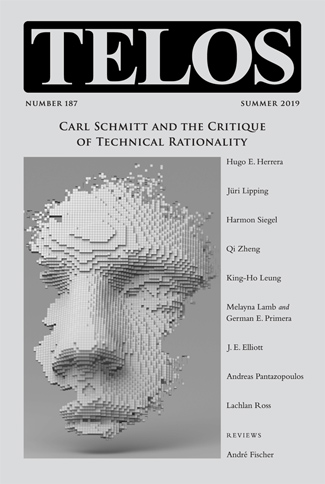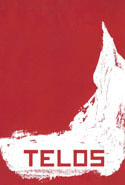By King-Ho Leung · Thursday, July 18, 2019 King-Ho Leung’s “Living Paradoxes: On Agamben, Taylor, and Human Subjectivity” appears in Telos 187 (Summer 2019). Read the full article at the Telos Online website, or purchase a print copy of the issue in our online store. Individual subscriptions to Telos are available in both print and online formats.
 Over the last two decades, Giorgio Agamben and Charles Taylor have produced important and influential genealogical works on the philosophical and political conceptions of secularity. Yet in their recent work, both of these thinkers have respectively returned to a prominent theme in their earlier works: human life. This essay offers a parallel reading of Agamben and Taylor as post-Heideggerian critics of the modern conception of human subjectivity. Through examining these their respective characterizations of modern subjectivity—namely, Taylor’s account of the “disengaged self” and Agamben’s conception of the “excluded-included” bare life—this essay seeks to highlight not only the Heideggerian currents underlying the philosophical anthropologies of Agamben and Taylor, but also the ontological paradoxicalities they detect in the conception of human existence and subjectivity in politico-philosophical modernity. After reviewing the different aspects of Agamben’s and Taylor’s critiques of modern subjectivity as well as the traditional metaphysical conception of humans as “language animals,” this essay concludes by sketching a robust and affirmative “paradoxical” conception of human beings as “language animals” that simultaneously takes into account the insights from Taylor’s (post)analytic philosophical renewal of Aristotelianism and Agamben’s critical analysis of contemporary biopolitics in the continental philosophical tradition. Over the last two decades, Giorgio Agamben and Charles Taylor have produced important and influential genealogical works on the philosophical and political conceptions of secularity. Yet in their recent work, both of these thinkers have respectively returned to a prominent theme in their earlier works: human life. This essay offers a parallel reading of Agamben and Taylor as post-Heideggerian critics of the modern conception of human subjectivity. Through examining these their respective characterizations of modern subjectivity—namely, Taylor’s account of the “disengaged self” and Agamben’s conception of the “excluded-included” bare life—this essay seeks to highlight not only the Heideggerian currents underlying the philosophical anthropologies of Agamben and Taylor, but also the ontological paradoxicalities they detect in the conception of human existence and subjectivity in politico-philosophical modernity. After reviewing the different aspects of Agamben’s and Taylor’s critiques of modern subjectivity as well as the traditional metaphysical conception of humans as “language animals,” this essay concludes by sketching a robust and affirmative “paradoxical” conception of human beings as “language animals” that simultaneously takes into account the insights from Taylor’s (post)analytic philosophical renewal of Aristotelianism and Agamben’s critical analysis of contemporary biopolitics in the continental philosophical tradition.
Continue reading →
By Jay A. Gupta · Friday, July 8, 2016 A recent piece in the Atlantic by Jonathan Merritt declares the “death of moral relativism.” It echoes observations made by other pundits that there seems to have been a shift in cultural attitudes concerning morality. In the United States, subjectivist, relativist, and “postmodernist” stances are said to have been replaced by robust commitments to social justice, tolerance, and inclusion. David Brooks also, for example, discusses the rise of a veritable “shame culture,” particularly evident on American college campuses and social media, ready to condemn and ostracize those who fail to acknowledge the importance of upholding these new, powerful norms of respect and recognition for the marginalized and oppressed. Indeed, the trend is so omnipresent that there has been significant backlash—critics decry the policing efforts of “social justice warriors” and the scourge of “political correctness.”
Continue reading →
By Christian Kronsted · Tuesday, August 13, 2013 As an occasional feature on TELOSscope, we highlight a past Telos article whose critical insights continue to illuminate our thinking and challenge our assumptions. Today, Christian Kronsted looks at Lowell A. Dunlap’s “Hume, James, and Husserl on the Self,” from Telos 2 (Fall 1968).
 With the publication of A Treatise Of Human Nature, David Hume turned the philosophical community of his time upside down with his provocative skepticism and denial of a cohesive self. Since its initial publication, Hume’s claim that the self is nothing but a bundle of perceptions has plagued philosophers and psychologists alike, and has inspired many to completely abandon the idea of a coherent self. Yet a central question remains largely unanswered: if there is not a self, what is doing the thinking, and how is it done? If a person does not have a “self,” how come human beings think of themselves as unique and separate entities that have subjective experiences? Lowell A. Dunlap’s article “Hume, James, and Husserl on the Self” investigates how William James and Edmund Husserl tackled the notion of personal identity in the aftermath of Hume’s philosophy. With the publication of A Treatise Of Human Nature, David Hume turned the philosophical community of his time upside down with his provocative skepticism and denial of a cohesive self. Since its initial publication, Hume’s claim that the self is nothing but a bundle of perceptions has plagued philosophers and psychologists alike, and has inspired many to completely abandon the idea of a coherent self. Yet a central question remains largely unanswered: if there is not a self, what is doing the thinking, and how is it done? If a person does not have a “self,” how come human beings think of themselves as unique and separate entities that have subjective experiences? Lowell A. Dunlap’s article “Hume, James, and Husserl on the Self” investigates how William James and Edmund Husserl tackled the notion of personal identity in the aftermath of Hume’s philosophy.
Continue reading →
|
|
 Over the last two decades, Giorgio Agamben and Charles Taylor have produced important and influential genealogical works on the philosophical and political conceptions of secularity. Yet in their recent work, both of these thinkers have respectively returned to a prominent theme in their earlier works: human life. This essay offers a parallel reading of Agamben and Taylor as post-Heideggerian critics of the modern conception of human subjectivity. Through examining these their respective characterizations of modern subjectivity—namely, Taylor’s account of the “disengaged self” and Agamben’s conception of the “excluded-included” bare life—this essay seeks to highlight not only the Heideggerian currents underlying the philosophical anthropologies of Agamben and Taylor, but also the ontological paradoxicalities they detect in the conception of human existence and subjectivity in politico-philosophical modernity. After reviewing the different aspects of Agamben’s and Taylor’s critiques of modern subjectivity as well as the traditional metaphysical conception of humans as “language animals,” this essay concludes by sketching a robust and affirmative “paradoxical” conception of human beings as “language animals” that simultaneously takes into account the insights from Taylor’s (post)analytic philosophical renewal of Aristotelianism and Agamben’s critical analysis of contemporary biopolitics in the continental philosophical tradition.
Over the last two decades, Giorgio Agamben and Charles Taylor have produced important and influential genealogical works on the philosophical and political conceptions of secularity. Yet in their recent work, both of these thinkers have respectively returned to a prominent theme in their earlier works: human life. This essay offers a parallel reading of Agamben and Taylor as post-Heideggerian critics of the modern conception of human subjectivity. Through examining these their respective characterizations of modern subjectivity—namely, Taylor’s account of the “disengaged self” and Agamben’s conception of the “excluded-included” bare life—this essay seeks to highlight not only the Heideggerian currents underlying the philosophical anthropologies of Agamben and Taylor, but also the ontological paradoxicalities they detect in the conception of human existence and subjectivity in politico-philosophical modernity. After reviewing the different aspects of Agamben’s and Taylor’s critiques of modern subjectivity as well as the traditional metaphysical conception of humans as “language animals,” this essay concludes by sketching a robust and affirmative “paradoxical” conception of human beings as “language animals” that simultaneously takes into account the insights from Taylor’s (post)analytic philosophical renewal of Aristotelianism and Agamben’s critical analysis of contemporary biopolitics in the continental philosophical tradition.  With the publication of A Treatise Of Human Nature, David Hume turned the philosophical community of his time upside down with his provocative skepticism and denial of a cohesive self. Since its initial publication, Hume’s claim that the self is nothing but a bundle of perceptions has plagued philosophers and psychologists alike, and has inspired many to completely abandon the idea of a coherent self. Yet a central question remains largely unanswered: if there is not a self, what is doing the thinking, and how is it done? If a person does not have a “self,” how come human beings think of themselves as unique and separate entities that have subjective experiences? Lowell A. Dunlap’s article “Hume, James, and Husserl on the Self” investigates how William James and Edmund Husserl tackled the notion of personal identity in the aftermath of Hume’s philosophy.
With the publication of A Treatise Of Human Nature, David Hume turned the philosophical community of his time upside down with his provocative skepticism and denial of a cohesive self. Since its initial publication, Hume’s claim that the self is nothing but a bundle of perceptions has plagued philosophers and psychologists alike, and has inspired many to completely abandon the idea of a coherent self. Yet a central question remains largely unanswered: if there is not a self, what is doing the thinking, and how is it done? If a person does not have a “self,” how come human beings think of themselves as unique and separate entities that have subjective experiences? Lowell A. Dunlap’s article “Hume, James, and Husserl on the Self” investigates how William James and Edmund Husserl tackled the notion of personal identity in the aftermath of Hume’s philosophy. 

